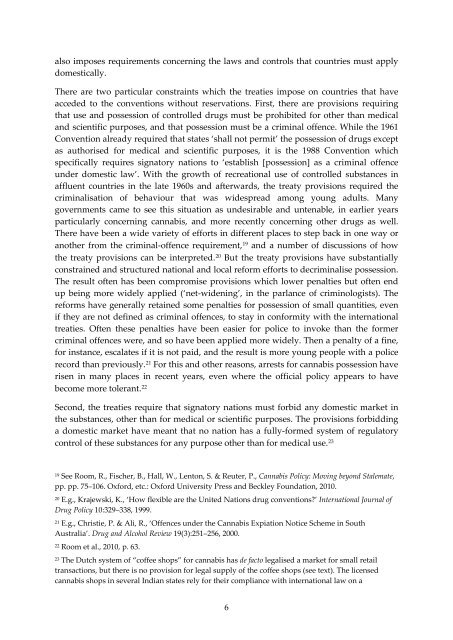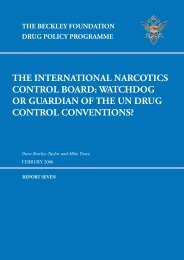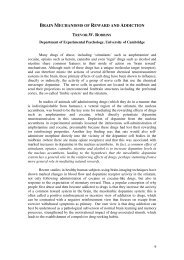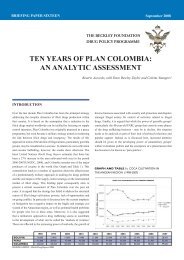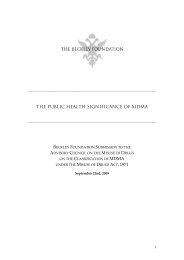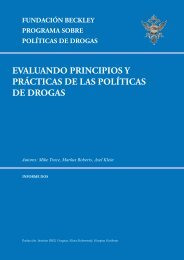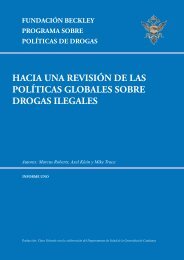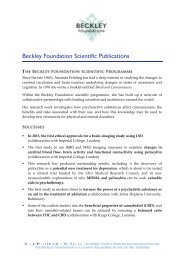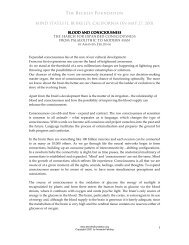Chapter 2. The present system, and directions for reformTHE PRESENT SYSTEM consists of three Conventions:• <strong>the</strong> 1961 Single Convention on Narcotic Drugs (and a 1972 pro<strong>to</strong>col amending it),primarily covering opium and its derivatives, coca bush derivatives, notably cocaine,and cannabis• The 1971 Convention on Psychotropic Substances, covering a wide range ofmanufactured psychoactive medications used pharmaceutically, includingamphetamines and benzodiazepides, as well as LSD and o<strong>the</strong>r psychedelicsubstances• The 1988 Convention against Illicit Traffic in Narcotic Drugs and Psychotropic Substances,primarily aiming <strong>to</strong> suppress illicit trafficking and including provisions attackingmoney-la<strong>un</strong>dering and controlling precursors <strong>to</strong> <strong>drug</strong>s controlled <strong>un</strong>der <strong>the</strong> 1961and 1971 <strong>conventions</strong>, and also including a requirement that possession or purchaseof controlled <strong>drug</strong>s be criminalised. 16As <strong>the</strong> 1961 Convention’s name spells out, it aimed <strong>to</strong> consolidate <strong>the</strong> confused tangle of<strong>conventions</strong>, agreements and pro<strong>to</strong>cols which had accrued in <strong>the</strong> intervening halfcenturysince <strong>the</strong> Opium Convention. But, as Bewley-Taylor and Jelsma havepersuasively argued, 17 <strong>the</strong> Single Convention was more than just a consolidation: whileprevious treaties had been ‘concerned predominantly with <strong>the</strong> regulation of <strong>the</strong> licittrade and <strong>the</strong> availability for medical purposes of a range of <strong>drug</strong>s’, <strong>the</strong> SingleConvention considerably extended <strong>the</strong> scope of proscription, gaining wide internationalagreement on requirements for national penal provisions for many activities. Thisorientation of <strong>the</strong> Single Convention served as <strong>the</strong> frame for fur<strong>the</strong>r extensions by <strong>the</strong>two later treaties.The resulting system thus goes far beyond <strong>the</strong> cus<strong>to</strong>mary concerns of international lawswith regulating trade and o<strong>the</strong>r relations between nations – although <strong>the</strong> regulation oftrade in psychoactive substances is indeed one aspect of <strong>the</strong> treaties. 18 The treaty system16The treaties, <strong>the</strong> Single Convention on Narcotic Drugs (as amended by <strong>the</strong> 1972 Pro<strong>to</strong>col, <strong>the</strong>Convention on Psychotropic Substances of 1971, and <strong>the</strong> United Nations Convention against illicitTraffic in Narcotic Drugs and Psychotropic Substances of 1988, are conveniently collected in: UnitedNations Office on Drugs and Crime, The International Drug Control Conventions, New York: UnitedNations, 2009. http://www.<strong>un</strong>odc.org/<strong>un</strong>odc/en/treaties/index.html (accessed 2 July, 2012).17Bewley-Taylor, D. & Jelsma, M., Fifty Years of <strong>the</strong> 1961 Single Conventions on Narcotic Drugs: AReinterpretation, Amsterdam: Transnational Institute, Series on Legislative Reform of Drug Policies,No. 12, March 2011. www.tni.org/sites/www.tni.org/files/download/dlr12.pdf (accessed 8 July, 2012).18Babor, T., Caulkins, J., Edwards, G., Fischer, B., Foxcroft, D., Humphreys, K., Obot, I., Rehm, J.,Reuter, P., Room, R., Rossow, I. & Strang, J., Drug Policy and <strong>the</strong> Public Good, p. 212. Oxford, etc.:Oxford University Press, 2010.5
also imposes requirements concerning <strong>the</strong> laws and controls that co<strong>un</strong>tries must applydomestically.There are two particular constraints which <strong>the</strong> treaties impose on co<strong>un</strong>tries that haveacceded <strong>to</strong> <strong>the</strong> <strong>conventions</strong> without reservations. First, <strong>the</strong>re are provisions requiringthat use and possession of controlled <strong>drug</strong>s must be prohibited for o<strong>the</strong>r than medicaland scientific purposes, and that possession must be a criminal offence. While <strong>the</strong> 1961Convention already required that states ‘shall not permit’ <strong>the</strong> possession of <strong>drug</strong>s exceptas authorised for medical and scientific purposes, it is <strong>the</strong> 1988 Convention whichspecifically requires signa<strong>to</strong>ry nations <strong>to</strong> ‘establish [possession] as a criminal offence<strong>un</strong>der domestic law’. With <strong>the</strong> growth of recreational use of controlled substances inaffluent co<strong>un</strong>tries in <strong>the</strong> late 1960s and afterwards, <strong>the</strong> treaty provisions required <strong>the</strong>criminalisation of behaviour that was widespread among yo<strong>un</strong>g adults. Manygovernments came <strong>to</strong> see this situation as <strong>un</strong>desirable and <strong>un</strong>tenable, in earlier yearsparticularly concerning cannabis, and more recently concerning o<strong>the</strong>r <strong>drug</strong>s as well.There have been a wide variety of efforts in different places <strong>to</strong> step back in one way orano<strong>the</strong>r from <strong>the</strong> criminal-offence requirement, 19 and a number of discussions of how<strong>the</strong> treaty provisions can be interpreted. 20 But <strong>the</strong> treaty provisions have substantiallyconstrained and structured national and local reform efforts <strong>to</strong> decriminalise possession.The result often has been compromise provisions which lower penalties but often endup being more widely applied (‘net-widening’, in <strong>the</strong> parlance of criminologists). Thereforms have generally retained some penalties for possession of small quantities, evenif <strong>the</strong>y are not defined as criminal offences, <strong>to</strong> stay in conformity with <strong>the</strong> internationaltreaties. Often <strong>the</strong>se penalties have been easier for police <strong>to</strong> invoke than <strong>the</strong> formercriminal offences were, and so have been applied more widely. Then a penalty of a fine,for instance, escalates if it is not paid, and <strong>the</strong> result is more yo<strong>un</strong>g people with a policerecord than previously. 21 For this and o<strong>the</strong>r reasons, arrests for cannabis possession haverisen in many places in recent years, even where <strong>the</strong> official policy appears <strong>to</strong> havebecome more <strong>to</strong>lerant. 22Second, <strong>the</strong> treaties require that signa<strong>to</strong>ry nations must forbid any domestic market in<strong>the</strong> substances, o<strong>the</strong>r than for medical or scientific purposes. The provisions forbiddinga domestic market have meant that no nation has a fully-formed system of regula<strong>to</strong>rycontrol of <strong>the</strong>se substances for any purpose o<strong>the</strong>r than for medical use. 2319See Room, R., Fischer, B., Hall, W., Len<strong>to</strong>n, S. & Reuter, P., Cannabis Policy: Moving beyond Stalemate,pp. pp. 75–106. Oxford, etc.: Oxford University Press and <strong>Beckley</strong> Fo<strong>un</strong>dation, 2010.20E.g., Krajewski, K., ‘How flexible are <strong>the</strong> United Nations <strong>drug</strong> <strong>conventions</strong>?’ International Journal ofDrug Policy 10:329–338, 1999.21E.g., Christie, P. & Ali, R., ‘Offences <strong>un</strong>der <strong>the</strong> Cannabis Expiation Notice Scheme in SouthAustralia’. Drug and Alcohol Review 19(3):251–256, 2000.22Room et al., 2010, p. 63.23The Dutch system of “coffee shops” for cannabis has de fac<strong>to</strong> legalised a market for small retailtransactions, but <strong>the</strong>re is no provision for legal supply of <strong>the</strong> coffee shops (see text). The licensedcannabis shops in several Indian states rely for <strong>the</strong>ir compliance with international law on a6
- Page 2 and 3: ROADMAPS TO REFORMINGTHE UN DRUG CO
- Page 4 and 5: ContentsPreface ...................
- Page 6 and 7: PrefaceTHE IDEA FOR this Report cam
- Page 8: PART I. POSSIBLE ROADMAPS
- Page 11 and 12: hope for serious progress, but we c
- Page 13: We do not underestimate the difficu
- Page 17 and 18: domestic market, just as producers
- Page 19 and 20: Protocol strengthened some provisio
- Page 21 and 22: ut considerably less potency than s
- Page 23 and 24: has announced its intention to reac
- Page 25 and 26: objected to. Concerning the 1971 tr
- Page 27 and 28: Table 2. Summary of reservations to
- Page 29 and 30: Reservations about traditional use
- Page 31 and 32: As Swaine notes, ‘the Vienna Conv
- Page 33 and 34: unhappy about a country implementin
- Page 35 and 36: Preemption by a new ‘single conve
- Page 37 and 38: and their effort was rejected by a
- Page 39 and 40: national or subnational level. Proh
- Page 42 and 43: Chapter 5. Proposed treaty amendmen
- Page 44 and 45: Article 1. DefinitionsExcept where
- Page 46 and 47: Article 36 - penal provisionsIn Art
- Page 48 and 49: Article 7. Special Provisions regar
- Page 50 and 51: and to ensure adequate supplies of
- Page 52 and 53: Article 1 − definition of ‘cons
- Page 54 and 55: Article 19 - estimates of drug requ
- Page 56 and 57: Article 21. Limitation of Manufactu
- Page 58 and 59: contrary to a law or regulation ado
- Page 60 and 61: 1. in subparagraph (a):a) after ‘
- Page 62 and 63: ) for ‘in accordance with paragra
- Page 64 and 65:
include a number of general stateme
- Page 66 and 67:
the legality of drug possession. A
- Page 68 and 69:
Chapter 7. Conforming the 1961 Conv
- Page 70 and 71:
solely by Article 30, which require
- Page 72 and 73:
on trade activities referred to in
- Page 74 and 75:
(c) Require that licensed manufactu
- Page 76 and 77:
issued in the form of counterfoil b
- Page 78:
APPENDIXDETAILED COMMENTARY ON AMEN
- Page 81 and 82:
Articles 21-34 of the Convention im
- Page 83 and 84:
dispatch, transport, supply, purcha
- Page 85 and 86:
actions involving commercial quanti
- Page 87 and 88:
In the 1971 Convention the followin
- Page 89 and 90:
4.1.3 Option 2 - changes to Preambl
- Page 91 and 92:
separate estimates and statistical
- Page 93 and 94:
After ‘scientific research’, in
- Page 95 and 96:
would also include transforming a d
- Page 97 and 98:
(c) subject to the provisions of th
- Page 99 and 100:
endangered’ by a Party’s failur
- Page 101 and 102:
Article 9. Composition and Function
- Page 103 and 104:
2. The Board shall, in respect of c
- Page 105 and 106:
for the right of the INCB to establ
- Page 107 and 108:
) Subject to the deductions referre
- Page 109 and 110:
excess quantity must be deducted fr
- Page 111 and 112:
prohibition in Article 31(1)(b) aga
- Page 113 and 114:
4.8 Article 20 - statistical return
- Page 115 and 116:
separate returns would be required
- Page 117 and 118:
4.9.1 General comments on Article 2
- Page 119 and 120:
distributors), and any quantity tak
- Page 121 and 122:
a) The quantity consumed, within th
- Page 123 and 124:
Article 21 bis. Limitation of Produ
- Page 125 and 126:
to engage in cultivation; and culti
- Page 127 and 128:
the purposes of Option 2. However,
- Page 129 and 130:
in Article 29 to manufacture of mor
- Page 131 and 132:
) (i) Require medical prescriptions
- Page 133 and 134:
4.15 Article 31(1) - international
- Page 135 and 136:
commercial use. Export to a state o
- Page 137 and 138:
would automatically mean that posse
- Page 139 and 140:
preparatory acts, conspiracy and at
- Page 141 and 142:
offering for sale, distribution, 17
- Page 143 and 144:
Article 36. Penal Provisions1. a) S
- Page 145 and 146:
Article 36. Penal Provisions1. a) S
- Page 147 and 148:
Conference would have intended to a
- Page 149 and 150:
drugs (in more than small quantitie
- Page 151 and 152:
substances into its country or one
- Page 153 and 154:
apply to Schedule 1 substances. In
- Page 155 and 156:
substances (of more than a small qu
- Page 157 and 158:
1. The Parties shall require that t
- Page 159 and 160:
individuals may lawfully obtain, us
- Page 161 and 162:
4. The Parties shall furnish to the
- Page 163 and 164:
2. In subparagraph (b):a) after ‘
- Page 165 and 166:
obligations on Parties in respect o
- Page 167 and 168:
penalise preparatory acts in connec
- Page 169 and 170:
accordance with subparagraph (a) of
- Page 171 and 172:
Article 3(1)(c)(iii) warrants speci
- Page 173 and 174:
6.1.2. Option 1 - changes to the 19
- Page 175 and 176:
uncertainty. Accordingly, Article 3
- Page 177 and 178:
Consequently, Parties would also no
- Page 179:
…4. d) The Parties may provide, e


